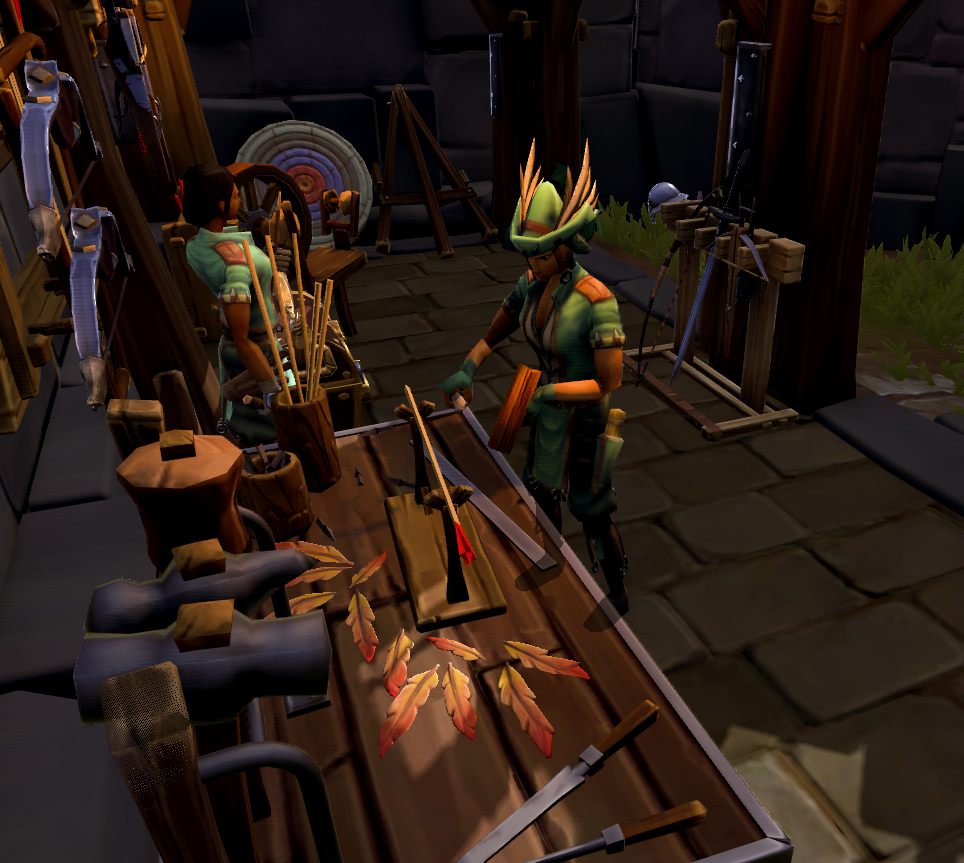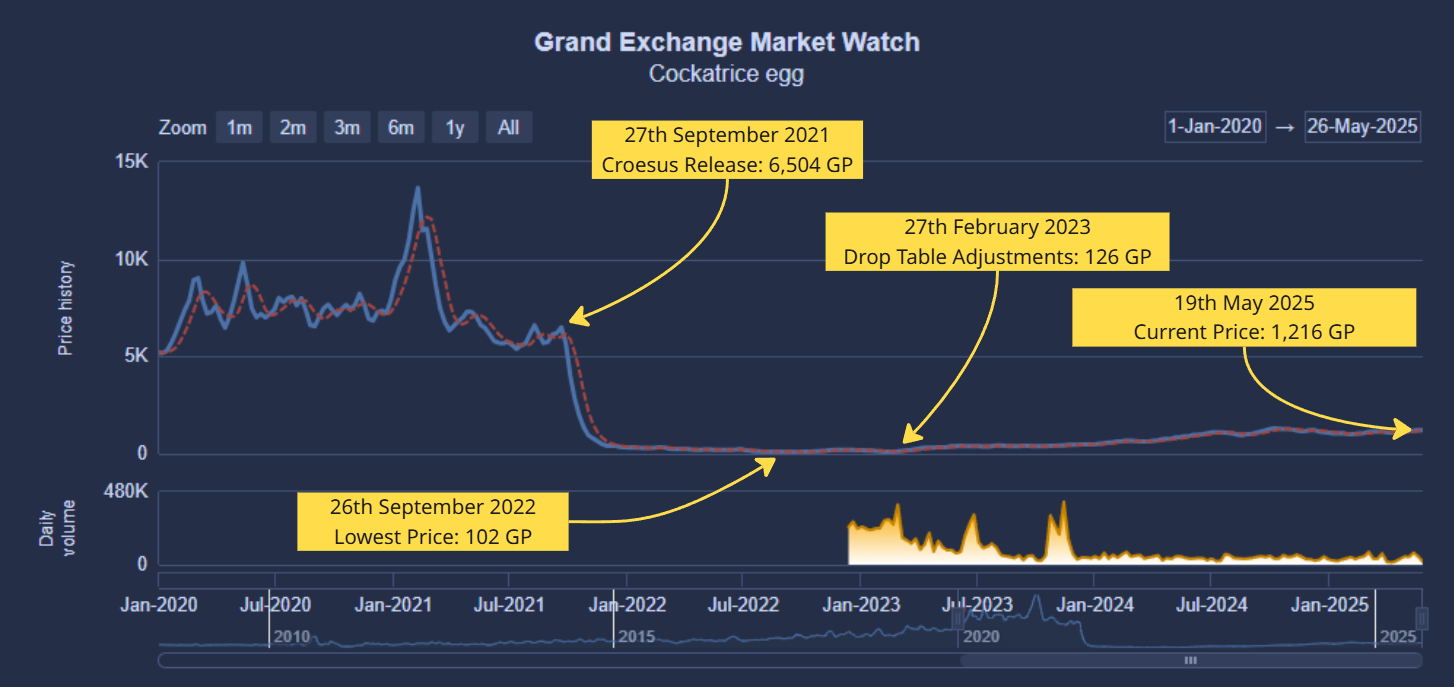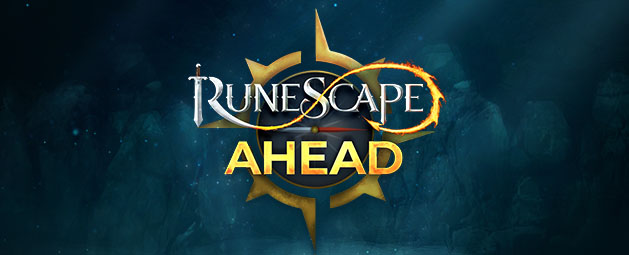This is part one of our May Game Health Feedback Response, you will find a link to part two at the bottom of this page and the second part will also feature in our news list on the website/launcher.
Hey everyone! We've spent some time in our balancing dungeon and we're back today to give you an update on the recent economy changes that we discussed last month as part of a Game Health update.
For a little context: In April, we released a news post titled "Roadmap Check In: May" as a quickfire look at everything happening this month. This included a summary of a Game Health Update to tune the drop tables of a handful of more recent bosses and Wilderness Flash Events, due to the effect they have on the game's economy.
We made the mistake of not covering this in a lot of detail, which understandably caused a lot of confusion - leaving you without much context or explanation. There were also some clear concerns in the community about certain content we were touching too.
We delayed the initial release to refine our approach based on your feedback and provide a more detailed look at our intentions - which is this blog!
We’ll start by explaining what exactly a “game health update” is, what type of things they cover, and why they matter. In the second part of this blog, we’ll break down the drop table changes discussed last month, including adjustments we’ve made since delaying them, and provide our reasoning for making all the changes we have.
What Are Game Health Updates?
Broadly speaking, the term ‘game health update’ is an umbrella term for any form of changes that we make to the game which we deem necessary to maintain and improve how the game is doing. This can refer to:
- Game progression encapsulates things such as skilling, quests, unlocks, game difficulty, and game modes such as Ironman.
- The game’s economy with rebalances - which can encompass buffs, nerfs, or 'neutral' changes.
- Game systems and how you interact with the game – such as the tutorial system, clan system, grouping system, or the user interface.
- Quality of life updates in their various forms.
- Technical updates such as code performance and maintenance.
In short, they can target a wide variety of things to ensure the game continues to provide a strong RuneScape experience while mitigating dangers that could affect the journey and experience of all players, from new to veteran. Many of our past updates would also count as game health updates, even if not directly called one.
After almost 25 years of being online and receiving weekly updates, RuneScape is a huge game with a complex web of interconnected content and systems that we need to maintain the balance of. RS is truly a living and breathing entity, one that needs to be maintained for another 25 years (and more!) still ahead of us. If you’re familiar with Old School RuneScape’s “Project Rebalance” or “Summer Sweep Up” then these are very similar.
We understand that such changes won’t always be loved. Changing aspects of content that players have frequently engaged with is going to cause some friction, especially if they’re lucrative or very rewarding.
However, maintaining the game’s health and providing a solid game experience requires making such changes. Keeping the community at its core is what Runescape does best. It's for this very reason that we delayed the update to make sure we captured and addressed the concerns you raised, and we want to hear your thoughts on what other drop tables or areas of the game could also use updates like this.
Why are Game Health Updates Necessary?
The playing field is always changing! RuneScape players know that game updates can have varying effects on the "meta" of skilling and PvMing, or on the value of existing in-game items, be it monetary or sentimental. Throughout its lifetime, RuneScape has seen many such scenarios where a game update can decrease or increase the GP value of an item, make a training method more or less viable, or even change the difficulty and grind of content.
In most cases, this is just a fact of life for RuneScape. In some cases, we’ll need to step in to maintain things we anticipate or know you would like maintained. As much as we don’t want to change the content you love, this interconnectedness and the sheer size of the game means that it’s important for us to tend to areas of the game that need the attention.
Maintaining the game’s health is a continuous effort and won’t be something that we could ever “complete”. Truthfully, we may never get around to doing everything with how big the game is, but we believe that taking it step by step and trying is better than doing nothing at all. It’s also important to note that there is no timeframe by which content is subject to change or not. Problematic content or systems are problematic regardless of how long they’ve been in the game or how long the problems have existed. With that being said, we will always want to give you a heads up and gather feedback where we can!
In regard to the recent drop table changes we presented, all of these drop tables were selected as they are major contributors to gold entering the game, either directly or through alchable items. They’re also major contributors to over-supplying certain items from their common loot table, injecting into the economy an overabundance of them, which negatively impacts the value of those items. In some cases, like Arch-Glacor, the bosses also harmed game progression by allowing players to easily gain GP, skilling ingredients, and combat XP all at the same time while AFKing. It’s for these kinds of reasons that game health updates are necessary.
As game designers, we know how fun it can be to feel like you’re progressing at an accelerated pace, or to find “the thing” to farm for a specific item you need – we routinely consider this when we design content. However, when it reaches a stage that is actively harming the game’s economy and a player’s experience playing through RuneScape, we need to act upon it. It would never be possible to create an exact method or pace we want players to experience RuneScape through, nor do we want that; however, rebalancing is and will continue to be an ongoing, evolving process.
Although they may affect a certain boss or method that a group of players really like, Game Health updates are a positive change for the game and player base as a whole. Maintaining a steady influx of certain items helps preserve their long-term value, even if the effects aren’t immediately noticeable. Regulating the supply of alchables or raw gold, in particular, helps curb inflation and can also support balanced game progression by managing the pace at which players advance. While we’re not aiming to prescribe a single way to play RuneScape, it’s important to ensure the game continues delivering the rich and rewarding experience it’s been known for over the past 25 years.

Update on Proposed Economy Changes
To reiterate from the original news post, these changes were targeted mostly at Elder God Wars bosses - alongside Raksha and Wilderness Flash Events. These areas are clear outliers with their influx of GP and over-supply of items coming into the game. For most, this was mainly from their common loot pools - while in some other cases, it was necessary to make wider changes. No rare or unique items were nerfed, and instead some were buffed.
As we got together to review the changes, we determined it best to make more holistic tweaks after reviewing the data once more - including reintroducing some value to some of the weaker drops that were changed. In addition to the original changes, we broadened the list of bosses and reviewed Croesus, Vorkath, Hermod and Rasial - and made changes to Vorkath and Rasial. Croesus and Hermod remain unchanged.
Before we get into the specifics, it’s good to lay out our design philosophy for these changes and future ones.
GP, Alchables, and Inflation.
Alchables bring a lot of raw GP into the game, sometimes more than we're comfortable with. A big reason for this is many of the bosses covered within this update.
Such amounts of gold injection into the game contributes heavily towards inflation, and while inflation itself is not a “bad” thing, uncontrolled inflation certainly is. An overabundance of GP in the game means that item prices also fluctuate, requiring more GP to buy things overall, and results in an inconsistent player-understanding of item values. In other scenarios, high amounts of accessible GP can also hurt game progression - like in the case of Ironman mode where the objective is to play RuneScape with limitations that impose a harder game difficulty.
Many of you will have seen game data from our January 2023 news post "Death Costs: A Matter Of Life And Death" which showed the top 10 gold sources and how much they added to the game each day on average. We've provided that same data again, and included up-to-date data from this month for comparison - to demonstrate the situation we're in right now:
| AVERAGE FOR JANUARY 2023 | |||
|---|---|---|---|
| Rank | Gold Source | Average Daily Added | % |
| 1 | Alchemy: Invention Machines | 92,237,061,446 | 45.88% |
| 2 | General Stores | 43,287,613,975 | 21.53% |
| 3 | Alchemy: High Alchemy | 24,735,268,309 | 12.30% |
| 4 | Monster Drops: Dropped to Floor | 14,557,269,208 | 7.24% |
| 5 | Monster Drops: Advanced Coin Magnet | 9,545,511,576 | 4.74% |
| 6 | Treasure Hunter: Cash Bags | 8,482,852,011 | 4.22% |
| 7 | Money Tree | 2,603,368,991 | 1.29% |
| 8 | Prifddinas Pickpocketing | 1,433,368,555 | 0.71% |
| 9 | Treasure Hunter: Direct Coin Prizes | 1,089,816,085 | 0.54% |
| 10 | Crystal chest | 884,965,556 | 0.44% |
| - | Other | 2,156,155,544 | 1.08% |
| AVERAGE FOR MAY 2025 | |||
|---|---|---|---|
| Rank | Gold Source | Average Daily Added | % |
| 1 | Alchemy: Invention Machines | 111,935,300,750 | 43.75% |
| 2 | Alchemy: High Alchemy | 57,281,982,103 | 22.39% |
| 3 | Alchemy: Spring Cleaner | 39,414,796,845 | 15.41% |
| 4 | Monster Drops: Dropped to Floor | 19,057,497,022 | 7.45% |
| 5 | Monster Drops: Advanced Coin Magnet | 6,805,537,734 | 2.66% |
| 6 | Treasure Hunter: Direct Coin Prizes | 5,131,190,476 | 2.01% |
| 7 | Treasure Hunter: Cash Bags | 3,744,776,349 | 1.46% |
| 8 | General Stores | 3,201,556,117 | 1.25% |
| 9 | Money Tree | 1,628,146,178 | 0.64% |
| 10 | Normal Pickpocketing | 1,319,092,797 | 0.52% |
| - | Other | 6,538,870,674 | 2.56% |
As you can see, high-alchemy is the bread-winner either directly or through things like Invention Machines and the Spring Cleaner. Compared to January 2023, invention machines are now bringing in an extra 20 billion GP each day. Meanwhile, GP introduced from direct high-alching has more than doubled! It's clear from this data that we have to take action due to the effects these are having.
Item Influx and Over-supply
Similarly, the overabundance of items also negatively impacts their prices. To put it simply, the more of an item that comes into the game and stays in the game, the less value it has over time as it becomes cheaper. A decreasing value of an item over time leads to drop tables dwindling in terms of how strong they may be across the board.
What this means is a boss that was once decent for its commons is now depending more heavily on the bigger drops. Skilling profitability can simultaneously suffer, as items that may have once been sought after from skilling are now over-supplied from other places. Once again this can also affect game progression, by allowing too easy access to things like skilling supplies or gear. Additionally, a decrease in value also means it’s harder to place that item on other drop tables, especially in new content.
By addressing these situations, it allows us to maintain the rate at which items come into the game. Reducing the over-supply over time allows the item to once again gain some value – although the effects of this usually won’t be immediate. We know from many past changes, such as the Croesus drop table adjustments back in 2023, that prices do recover given some time. For example, Cockatrice Eggs dropped from 6.5k GP to as low as 100 GP with Croesus' release, though ever since the February 2023 drop table adjustments they've continued to trend back upward, currently at ~1.1k GP. The image below shows the past 5 years of price data for Cockatrice Eggs and key points at which it changed.

While we’ll give further context on the changes below, we’ll drop a little statistic right now to highlight the severity of the situation.
Currently, of all the Banite Stone Spirits entering the game from NPCs on a daily basis, Arch-Glacor alone is responsible for 95% of them - every day! - with Hermod as the next largest contributor with just 3%! This effect is also visible when looking at the value of these stone spirits.
There's a direct correlation between the sharp decrease of their value and the release of Arch-Glacor. Unfortunately, the story is similar for many of the items found in the drop tables of Arch-Glacor and other Elder God Wars bosses, which you can see for yourself by looking at the price charts of those items via the RS Wiki.
Game Progression and the Player Journey
The final pillar of our design philosophy regarding these changes is maintaining game progression. Some of the changes we’re making, especially with alchables and others which we’ll detail below, aim at preserving some of the grind RuneScape is known for. However, it also serves to ensure that content is relevant throughout the game. While we know that the grind is very different 20+ years on, we still want to maintain an enjoyable and traditional RuneScape experience without letting players accelerate too fast with disproportionate input.
Players can unintentionally change their experience of the game by skipping over large sections of iconic content because certain newer content has completely surpassed it. This is especially true for bosses like Arch-Glacor which provide decent combat XP, skilling supplies for a variety of skills, and raw GP through coins and alchables all with a low barrier of entry for AFKing.
For example, It wouldn't make much sense for a player to go and do certain bosses when they could camp Arch-Glacor, use the gold from that to buy other gear, and skip parts of the progression almost unintentionally. For a boss whose mechanics are meant to teach new players RuneScape’s combat system, we know you’ll agree that this isn’t how RuneScape should be played. With Group Ironman, we’ve also observed that Arch-Glacor has been the go-to method for all the above, meaning players ignore content that could otherwise be beneficial and enjoyable.
As you can see from the above, it's a complex situation! Everything is connected and there is no "right" answer, highlighting the necessity to tweak and maintain things continuously where possible. Ultimately all of us, Jmods and players, care deeply about PvM and all other aspects of RuneScape and want to make sure it remains healthily balanced.
Head on over to the second part of our Game Health Update blog by clicking here to deep dive into the breakdown of the changes!

